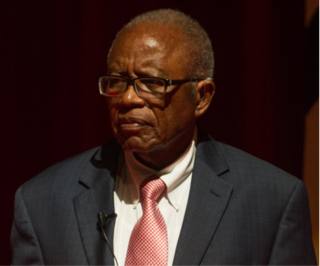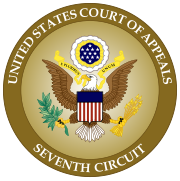Regents of the University of California v. Bakke, 438 U.S. 265 (1978), was a landmark decision by the Supreme Court of the United States. It upheld affirmative action, allowing race to be one of several factors in college admission policy. However, the court ruled that specific racial quotas, such as the 16 out of 100 seats set aside for minority students by the University of California, Davis School of Medicine, were impermissible.
Sweatt v. Painter, 339 U.S. 629 (1950), was a U.S. Supreme Court case that successfully challenged the "separate but equal" doctrine of racial segregation established by the 1896 case Plessy v. Ferguson. The case was influential in the landmark case of Brown v. Board of Education four years later.

Frank Hoover Easterbrook is a United States Circuit Judge of the United States Court of Appeals for the Seventh Circuit. He was Chief Judge from November 2006 to October 2013, and has been a judge on the court since 1985.
Tinker v. Des Moines Independent Community School District, 393 U.S. 503 (1969), was a landmark decision by the United States Supreme Court that defined First Amendment rights of students in U.S. public schools. The Tinker test, also known as the "substantial disruption" test, is still used by courts today to determine whether a school's interest to prevent disruption infringes upon students' First Amendment rights.
The term in loco parentis, Latin for "in the place of a parent" refers to the legal responsibility of a person or organization to take on some of the functions and responsibilities of a parent. Originally derived from English common law, it is applied in two separate areas of the law.

Damon Jerome Keith is a Senior United States Circuit Judge of the United States Court of Appeals for the Sixth Circuit and a former United States District Judge of the United States District Court for the Eastern District of Michigan.

The NAACP Legal Defense and Educational Fund, Inc. is a leading United States civil rights organization and law firm based in New York City.
A student publication is a media outlet such as a newspaper, magazine, television show, or radio station produced by students at an educational institution. These publications typically cover local and school related news, but they may also report on national or international news as well. Most student publications are either part of a curricular class or run as an extracurricular activity.

The Leonard Law is a California law passed in 1992 and amended in 2006 that applies the First Amendment of the United States Constitution to private and public colleges, high schools, and universities. The law also applies Article I, Section 2 of the California Constitution to colleges and universities. California is the only state to grant First Amendment protections to students at private postsecondary institutions. Attempts at a federal Leonard Law and for Leonard Laws in other states have not succeeded.
Case Western Reserve University School of Law is one of eight schools at Case Western Reserve University in Cleveland, Ohio. The law school is known for its innovation in legal education and blending of practice, theory, and professionalism. It has a long commitment to diversity and admitted students of color in its first entering class in 1892. It was one of the first schools accredited by the American Bar Association and it is a member of the Association of American Law Schools (AALS).

Fred David Gray is a civil rights attorney, preacher and activist who practices law in Alabama. He litigated several major civil rights cases in Alabama, including some that reached the United States Supreme Court for rulings. He served as the President of the National Bar Association in 1985 and in 2001 was elected as the first African-American President of the Alabama State Bar.

William Cameron Canby Jr. is a Senior United States Circuit Judge of the United States Court of Appeals for the Ninth Circuit, sitting in Phoenix, Arizona.
The University of Iowa College of Law is one of the eleven professional graduate schools at the University of Iowa, located in Iowa City, Iowa. It was founded in 1865. Iowa is ranked the 27th-best law school in the United States by the U.S. News and World Report "Best Law School" rankings.
The University of Texas School of Law is one of the professional graduate schools of the University of Texas at Austin. In 2018 the law school was ranked No. 15 by the U.S. News & World Report, and No. 12 by Above the Law Texas Law is consistently ranked among the top five public law schools in the United States. The school is also ranked No. 1 for the biggest return on investment among law schools in the United States. Every year, Texas Law places a large part of its class into the nation's largest law firms, where base salaries start at over $190,000.

Portland Adventist Academy (PAA) is a private high school located in Portland, Oregon, United States operated by the Seventh-day Adventist Church. It is a part of the Seventh-day Adventist education system, the world's second largest Christian school system. The school was founded in 1910, and was previously known as Portland Union Academy, serving grades 1-12. The name changed when the elementary section became its own school, Portland Adventist Elementary School in 1975. During the process, the high school section was renamed Portland Adventist Academy.
David O. Carter is a United States District Judge of the United States District Court for the Central District of California.

St. George Tucker, born in Bermuda, was a lawyer and, after the American Revolution, a professor of law at the College of William and Mary. He notably increased the requirements for a law degree at the college, as he believed lawyers needed deep educations. He served as a judge of the General Court of Virginia and later on the Court of Appeals.

Gay Student Services v. Texas A&M University, 737 F.2d 1317 is a court case in which the Fifth U.S. Circuit Court of Appeals held that the First Amendment required public universities to recognize student organizations aimed at gay students. In 1976, Texas A&M University denied official recognition to the Gay Student Services Organization on the grounds that homosexuality was illegal in Texas, and the group's stated goals—offering referral services and providing educational information to students—were actually the responsibility of university staff. The students sued the university for violation of their First Amendment right to freedom of speech in February 1977. For six years, the case wound its way through the courts; although the trial court ruled in favor of Texas A&M several times, the Fifth U.S. Circuit Court of Appeals repeatedly overturned the verdict. The U.S. Supreme Court declined to take the case, letting stand the circuit court ruling that the students' free speech rights had been compromised.
Hazelwood School District et al. v. Kuhlmeier et al., 484 U.S. 260 (1988), was a landmark decision by the Supreme Court of the United States that held that public school curricular student newspapers that have not been established as forums for student expression are subject to a lower level of First Amendment protection than independent student expression or newspapers established as forums for student expression.
Wayne State University School of Social Work is a professional school within Wayne State University in Detroit, Michigan. The school is ranked No. 34 nationally in the U.S. News & World Report Best Global University Ranking. Its online social work degree program has been ranked No. 2 nationally by the Social Work Degree Guide, trailing only the Boston University School of Social Work.











